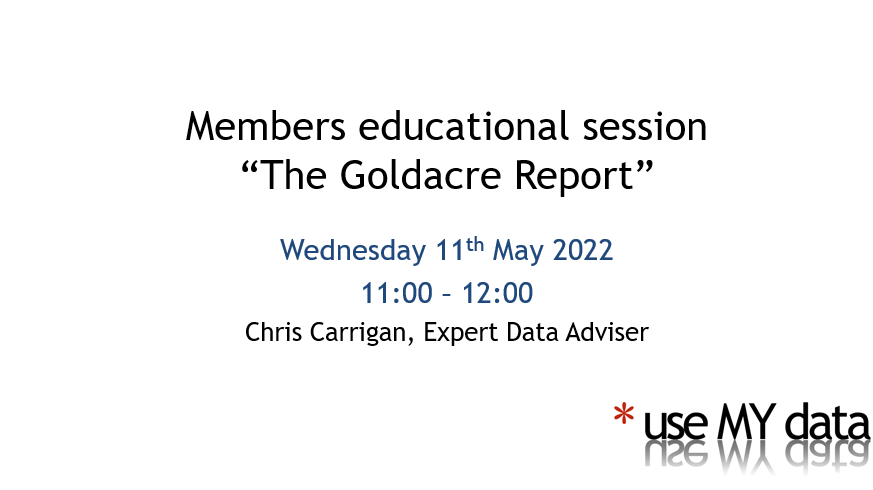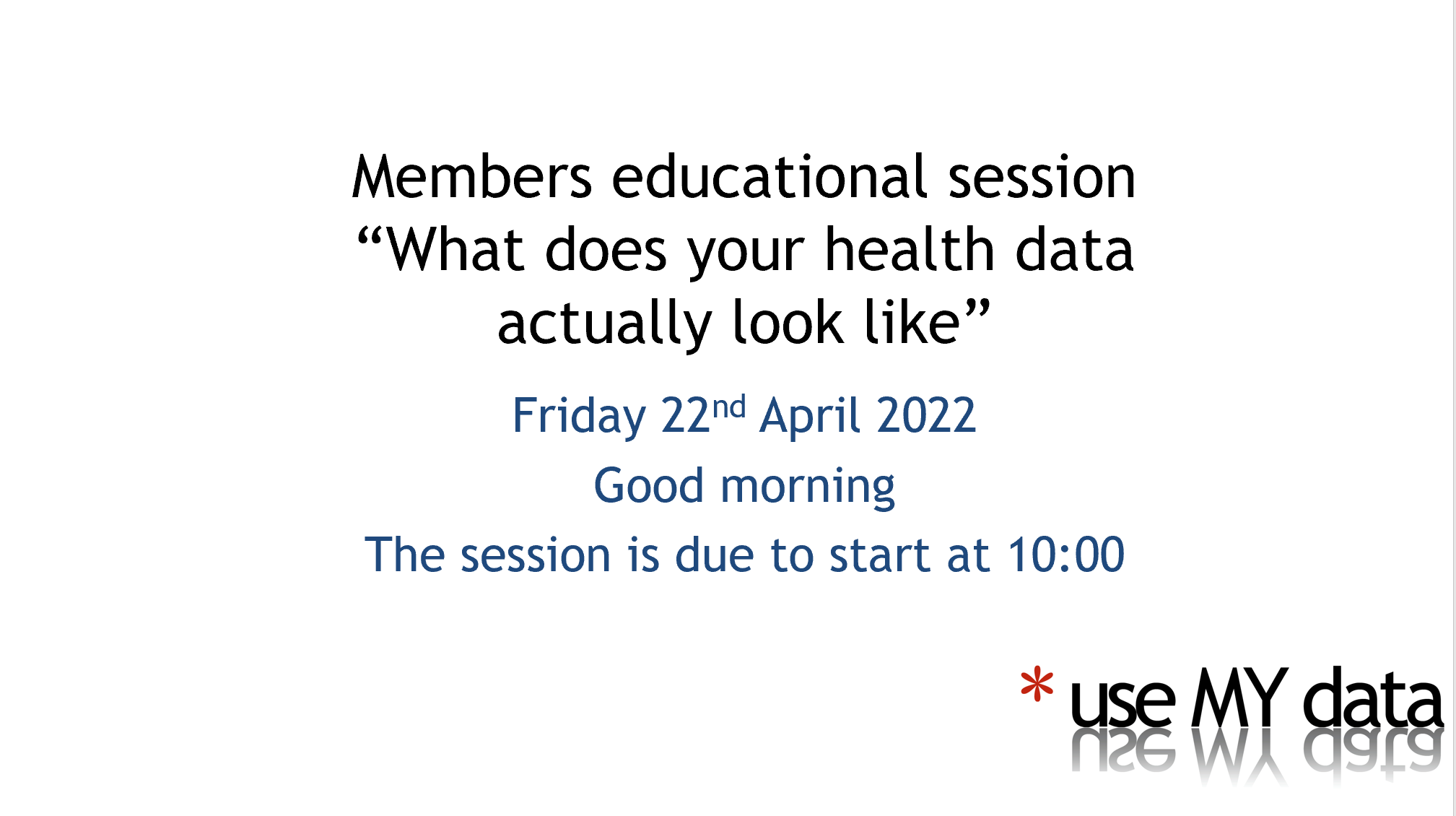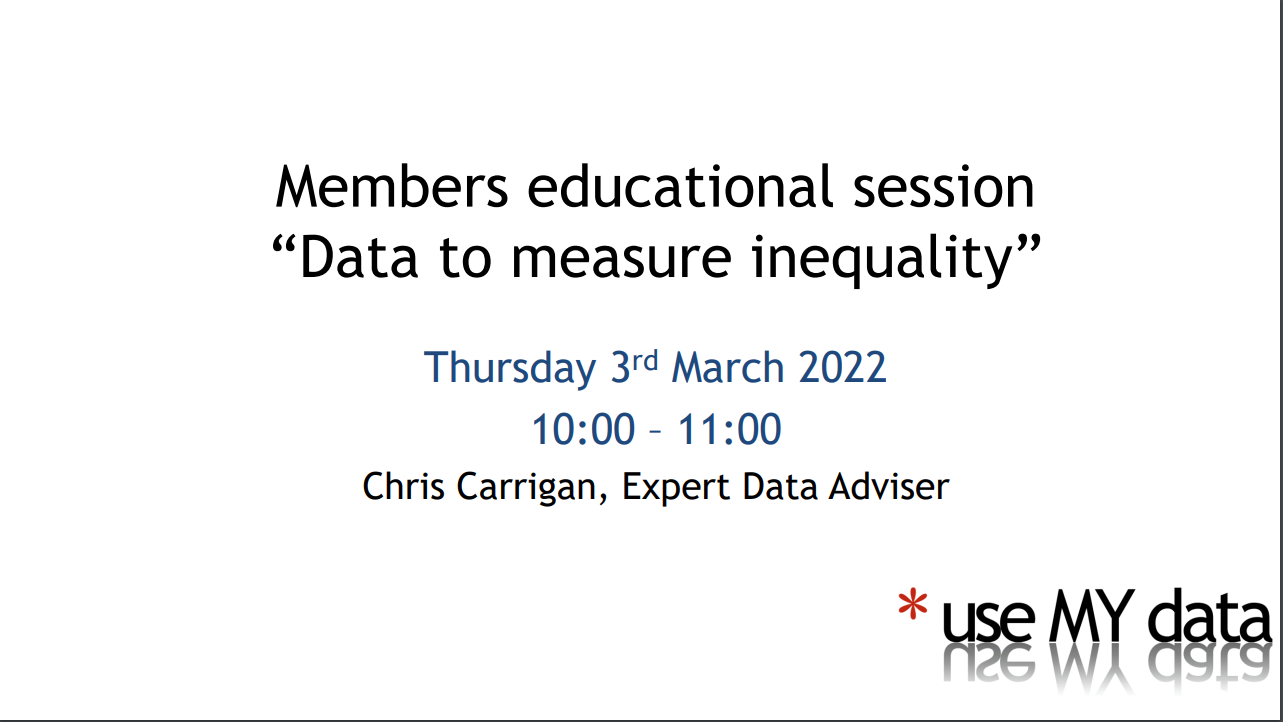One of the benefits of being a use MY data Member is to be able to take part in our regular Education Sessions.
All the topics are suggested by our Members and are organised by our Comms & Media Lead and our Data Adviser, giving Members the opportunity to be part of a conversation on a range of subjects.
These sessions run approximately every 3 weeks through the year and cover a wide range of data-related topics and activities.
On this page the recordings of all our Education Sessions are freely available to watch again, but only Members can take part in these sessions.
We notify our Members of the sessions in our weekly newsletter - another benefit of being a Member.
What does my health data look like? A journey from your hospital record to a research dataset
Friday 26 January 2024 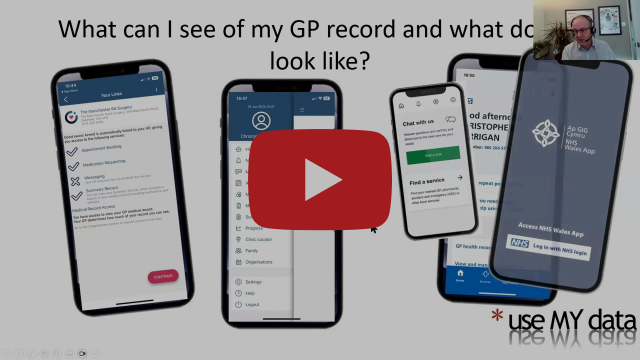
This Education Session revisited the question that we regularly hear from Members; “What does my health data looks like?”
The session explored the process of how your health data gets created, where it is held and what it looks like. It also looked in more detail at the ways that your data is stored for research purposes, including what parts of your data is held in the newly emerging Secure Data Environments and Trusted Research Environments.
The recording of the session is available here.
Social Care Data - the untapped potential
Friday 24 November 2023
Several factors, including population ageing, improvements in treatment for complex disease and the cost of living crisis, are putting immense pressure on the National Health Service (NHS).
This pressure is also mounting in each of the devolved nations social care systems, which are inextricably linked to the NHS.
The use of routine medical records in research with the goal of improving care and outcomes for patients is well established. Yet, the same cannot be said for social care records.
In this session, Dr Elizabeth Lemmon, Lecturer in Health Economics at the University of Edinburgh and founder of Early Career Researchers Using Scottish Administrative Data (eCRUSADers), presented an overview of social care datasets in the UK, with a particular focus on social care data relating to older people.
She discussed a unique social care dataset that is collected in Scotland and presented her research plans for the upcoming years which seek to utilise this untapped source of data to further understand the contribution such a dataset can have in improving the lives older adults living in Scotland.
The recording of the session is available here.
Population Health Management
Monday 23 October 2023
The term Population Health Management is being increasingly used, particularly in relation to the uses of large volumes patient (and other) data. But what is Population Health Management, and what potential does it offer?
A very recent study lists engaging with members of the public as a top priority in maximising the UK data potential. How best to do this for Population Health Management is unclear, particularly as the concept itself is not well understood by the public.
In this Education Session, run with the University of Plymouth, we heard about not just the basics and potential outcomes of Population Health Management (which uses historical, pseudonymised, linked health and social care datasets), but also discussed views on proposals being developed by the University to understand how Integrated Care Systems should organise and implement Population Health Management to achieve these outcomes.
The recording of the session is available here.
Statutory Guidance: NHS England’s protection of patient data
Tuesday 27 June 2023
An education session with Osman Sabir and Gareth James (Department of Health & Social Care, Data Policy Department) to talk about the recent publication of Statutory Guidance issued to NHS England describing to their role in the use and protection of NHS patient data..
The recording of the session is available here.
The National Disease Registration Service (NDRS) – an introduction
Monday 19 June 2023
An education session giving background and understanding of National Disease Registration Service (NDRS), which includes information about the data, the processes, the uses and the challenges the service faces.
The recording of the session is available here.
Artificial Intelligence and Machine Learning – an introduction
Monday 15 May 2023
An education session giving the background and understanding of Artificial Intelligence (AI) and Machine Learning (ML).
The session was originally run as a precursor to our webinar “Artificial Intelligence; what's the reality?” and was repeated at the request from Members. The session includes aspects of terminology including big data, machine learning, risks, ethics and safeguards. Includes questions from the delegates.
This one hour educational session first ran on 24 February 2023 and was repeated (and recorded) on 15 May 2023.
The recording of the session is available here.
Speak with the Analyst: session 2
Friday 5 May 2023
A session with Christine Delon from Cancer Research UK describing how she is using patient data to analyse cancer incidence by ethnicity in the England Cancer Registry, including how this work can help understand and address inequality.
The recording of the session is available here.
Speak with the Analyst: session 1
Friday 28 April 2023
An education session Lucy Ross from Cancer Research UK on her work looking at repeat GP consultations for signs/symptoms of cancer before, throughout, and beyond the COVID-19 restrictions, and how her work can help patients and the public.
The results which are discussed in the session are unpublished and confidential.
Anonymised, pseudonymised, anonymous – what do these terms mean for patient data?
Friday 24 February 2023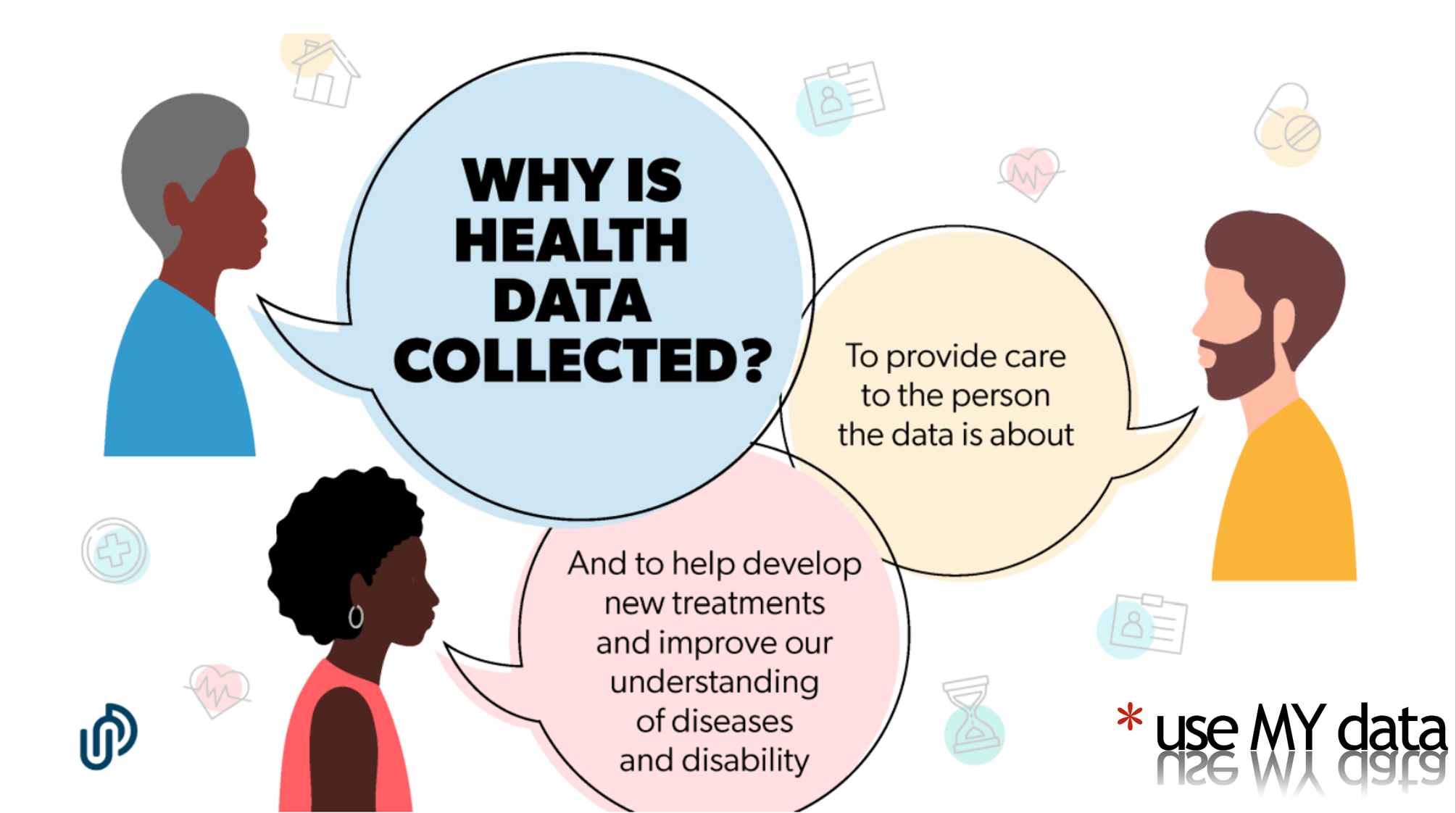
Different terms are often used to describe patient data which cannot be directly identified. As well as being confusing, these terms are often misused.
The topic covered in this session has been suggested by some of our members to try and help aid people’s understanding of what these terms mean. During the session we explored what the various terms are that are frequently used, covering the differences between anonymised, pseudonymised and anonymous data, together with some of the benefits and difficulties of using these types of data.
The recording of the session is available here.
Environments & Children's Health Outcomes
Friday 13 January 2023
Researchers from UCL Great Ormond street Institute of Child Health have just launched a programme called Kids Environment and Health Cohort which will allow researchers to study the link between environments in and around schools and homes, and children’s health and education.
At this Members Education Session we heard the team talk about how they are linking environmental, health and education data and their research to date. We also heard about similar work which has been done over the past few years as part of the Born in Bradford project.
The recording of the session is available here.
Personal Health Records
Friday 2 December 2022
Have you ever heard the term Personal Health Record, and wondered what it is, who uses them, and if it the same as an Electronic Health Record?
Our use MY data educational session heard from one of our Members, Fran Husson, who is an active user of her own Personal Health Record. Fran explained what patient ownership of data actually means in practice and the positive difference having a Personal Health Record has had on her care.
We were also be joined by Sally Rennison from Patients Know Best, the organisation which owns the most widely used Personal Health Record in the country, who talked us through how you can get a Personal Health Record and what the challenges the organisation faced in making them available.
The recording of the session is available here.
Statistical Terms
Friday 11 November 2022
One of the common requests that we have from members is for an education session to provide a brief introduction to the various statistical terms relating to health care data that members may come across. This session was a short overview of the common statistical terms and methods used when presenting data about health care, how, where and why they are used, and what they should mean to you.
Synthetic (or Simulated) Data, what is it and how is it used?
Tuesday 13 September 2022
In a world where there is often significant risk-aversion to the sharing of patient data, there has been increasing interest in the topic of synthetic data (sometimes called simulated data) to make research possible in a safe, secure way. In essence, synthetic data is designed to look closely like the real data it represents, but is completely fictitious.
The Simulacrum is one example of synthetic data in real use. It is a database of artificial patient-like cancer data, which is being used by researchers with no danger of breaching patient confidentiality.
At our interactive Education session, members had the opportunity to hear from Paul Berg, Head of Real World Solutions at IQVIA, and Julia Levy, Principal for Oncology Real World Evidence. Paul and Julia have been active users of the Simulacrum for some years, and described how the Simulacrum has been used, by whom, and for what benefit. The session was about real, actual, practical uses, not just the theory….!
What’s in the new NHS Data Strategy, how does it reflect our own thoughts, and what do you think?
Friday 15 July 2022
On 13 June the Department of Health & Social care in England published the new Data Strategy; “Data saves lives: reshaping health and social care with data”. The Strategy “sets out ambitious plans to harness the potential of data in health and care in England, while maintaining the highest standards of privacy and ethics.”
On Friday 15th July we held an Educational Drop-In Session which looked at the contents of the Strategy, highlighted and discussed the key areas of interest to use MY data Members, flagged good point, bad points, any areas of concern and any things which we thought were missing.
You can read the Strategy here:
https://www.gov.uk/government/publications/data-saves-lives-reshaping-health-and-social-care-with-data
A recording of the session can be viewed here
and the slides are available here.
On Friday 22 April we ran a 1-hour educational session for use MY data Members, on the topic What does your health data actually look like?
During the session we walked through the process of how health data gets created, where it is held and what it looks like. We also covered where your data goes once it has been collected as part of your care.
On Thursday 3 March we ran a 1-hour educational session for use MY data Members, on the topic “Data to measure inequalities”. The session was held on Zoom and, as always with our activities, was free to attend.
The session comprised a short presentation about different dimensions of equality, including an overview of what patient data exists to measure inequality. The session included a more detailed look at ethnicity data in particular, including where data is recorded (and where it isn’t), where it has been used to measure inequality in areas of health, and how you can see some of these results.
This first educational session was a pilot for us to explore whether to run a series of similar events throughout the year. The purpose of the sessions was to provide an overview on specific data-related topics that our Members might want to find out more about. We wanted to make the event as interesting and useful as possible whilst also enabling a two-way dialogue, something which is often difficult to do online.


